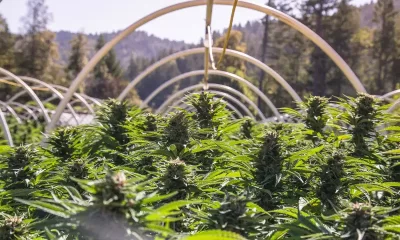Business
California Cannabis Prisoner Luke Scarmazzo Released from Federal Prison

Luke Scarmazzo, the last known federal medical cannabis prisoner in California, has finally been released.
California cannabis prisoner Luke Scarmazzo was freed from prison on Feb. 3, with help from Mission Green, a campaign led by The Weldon Project. “Today, after serving nearly 15 years in prison for operating a cannabis dispensary, I was granted my freedom,” Scarmazzo wrote on his Facebook page. “The feeling is surreal. We’ve worked toward this day for so long. This was a huge victory for my family, friends, community and the entire cannabis movement. I’ll take a moment to enjoy this, but make no mistake, there’s still much work to be done—my people need to be free—and that hard work begins now.”
Scarmazzo owned a Modesto-based dispensary, called the California Healthcare Collective (CHC), with Ricardo Montes in 2004. In September 2006, the Drug Enforcement Administration (DEA) raided CHC and Scarmazzo and Montes, who were 26 at the time, were found guilty in 2008. Ultimately Scarmazzo was sentenced to 21 years and 10 months, and Montes was sentenced to 20 years. Montes was later pardoned by former President Barack Obama in 2017, but Scarmazzo remained in prison.
Scarmazzo petitioned for release in January 2021, but was denied. On Facebook, he shared the details of his life in prison after the denial. “I have been in this quarantine unit in a federal penitentiary at Yazoo City, Mississippi for 91 days. When I arrived here prison officials lied and told me I’d only be here the standard 14 days. This, despite me being ‘COVID recovered’ in September 2020, with at least a temporary acquired natural immunity,” Scarmazzo wrote. “I’m locked into my cell 24 hours a day, 7 days a week. Out of 168 hour week, I’m allowed out of my cell for 3 hours to take a shower and use the phone; the other 165 I’m in a concrete box. I haven’t felt the warm sun or inhaled a breath of fresh air in over 3 months. I’m fed enough to be kept alive and confined in frigid temperatures. And these are just a few of the blatant constitutional and human rights violations that I endure daily without just cause.”
During his sentence, Scarmazzo met Weldon Angelos, an inmate who was sentenced to 55 years in prison for a cannabis conviction. The two spent seven years in prison together, but eventually in 2016 Angelos was released after having served for 13 years, and received a full pardoned in December 2020. After being released, Angelos founded The Weldon Project and has continued to advocate for the release of other prisoners who are still serving time for cannabis convictions.

“Happy to announce that Luke is being released today! The judge granted compassionate release based on policy changes at the federal!” Angelos shared on Twitter the day that Scarmazzo was released.
Judge Dale Drozd issued a compassionate release order based on his case. “Defendant Scarmazzo is certainly correct when he argues that there have been ‘dramatic changes in the legal landscape concerning the sale and use of marijuana’ over the 15 years since he was sentenced, including ‘changes in [state] marijuana laws, Congress’s perspective, public sentiment, the Justice Department’s enforcement policies, and…case law.’ This is particularly true in California where [the] defendant was operating his marijuana dispensary,” Drozd wrote. “While federal law remains unchanged—still making the possession, cultivation and distribution of marijuana unlawful and subject to criminal penalties—federal prosecutions for marijuana-related offenses have been curbed significantly, particularly in states like California that have legalized those activities with some restrictions. In the undersigned’s experience, for the most part federal prosecution of marijuana offenses in California is now limited to those offenders engaged in large, unauthorized cultivation sites located on federal lands.”Like Angelos, Scarmazzo has pledged to help others like himself be freed from prison for cannabis convictions. In October 2022, the U.S. Sentencing Commission estimated that more than 6,577 people who receive pardons from the Biden administration after President Joe Biden announced pardons for simple cannabis possession. California Gov. Gavin Newsom announced 10 pardons in December 2022, with at least two of those prisoners having cannabis convictions. Pennsylvania Gov. Tom Wolf also recently pardoned 2,500 people in January 2023, 400 of which were convicted of nonviolent cannabis offenses.
Source: https://hightimes.com/news/california-cannabis-prisoner-luke-scarmazzo-released-from-federal-prison/
Business
New Mexico cannabis operator fined, loses license for alleged BioTrack fraud

New Mexico regulators fined a cannabis operator nearly $300,000 and revoked its license after the company allegedly created fake reports in the state’s traceability software.
The New Mexico Cannabis Control Division (CCD) accused marijuana manufacturer and retailer Golden Roots of 11 violations, according to Albuquerque Business First.
Golden Roots operates the The Cannabis Revolution Dispensary.
The majority of the violations are related to the Albuquerque company’s improper use of BioTrack, which has been New Mexico’s track-and-trace vendor since 2015.
The CCD alleges Golden Roots reported marijuana production only two months after it had received its vertically integrated license, according to Albuquerque Business First.
Because cannabis takes longer than two months to be cultivated, the CCD was suspicious of the report.
After inspecting the company’s premises, the CCD alleged Golden Roots reported cultivation, transportation and sales in BioTrack but wasn’t able to provide officers who inspected the site evidence that the operator was cultivating cannabis.
In April, the CCD revoked Golden Roots’ license and issued a $10,000 fine, according to the news outlet.
The company requested a hearing, which the regulator scheduled for Sept. 1.
At the hearing, the CCD testified that the company’s dried-cannabis weights in BioTrack were suspicious because they didn’t seem to accurately reflect how much weight marijuana loses as it dries.
Company employees also poorly accounted for why they were making adjustments in the system of up to 24 pounds of cannabis, making comments such as “bad” or “mistake” in the software, Albuquerque Business First reported.
Golden Roots was fined $298,972.05 – the amount regulators allege the company made selling products that weren’t properly accounted for in BioTrack.
The CCD has been cracking down on cannabis operators accused of selling products procured from out-of-state or not grown legally:
- Regulators alleged in August that Albuquerque dispensary Sawmill Sweet Leaf sold out-of-state products and didn’t have a license for extraction.
- Paradise Exotics Distro lost its license in July after regulators alleged the company sold products made in California.
Golden Roots was the first alleged rulebreaker in New Mexico to be asked to pay a large fine.
Source: https://mjbizdaily.com/new-mexico-cannabis-operator-fined-loses-license-for-alleged-biotrack-fraud/
Business
Marijuana companies suing US attorney general in federal prohibition challenge

Four marijuana companies, including a multistate operator, have filed a lawsuit against U.S. Attorney General Merrick Garland in which they allege the federal MJ prohibition under the Controlled Substances Act is no longer constitutional.
According to the complaint, filed Thursday in U.S. District Court in Massachusetts, retailer Canna Provisions, Treevit delivery service CEO Gyasi Sellers, cultivator Wiseacre Farm and MSO Verano Holdings Corp. are all harmed by “the federal government’s unconstitutional ban on cultivating, manufacturing, distributing, or possessing intrastate marijuana.”
Verano is headquartered in Chicago but has operations in Massachusetts; the other three operators are based in Massachusetts.
The lawsuit seeks a ruling that the “Controlled Substances Act is unconstitutional as applied to the intrastate cultivation, manufacture, possession, and distribution of marijuana pursuant to state law.”
The companies want the case to go before the U.S. Supreme Court.
They hired prominent law firm Boies Schiller Flexner to represent them.
The New York-based firm’s principal is David Boies, whose former clients include Microsoft, former presidential candidate Al Gore and Elizabeth Holmes’ disgraced startup Theranos.
Similar challenges to the federal Controlled Substances Act (CSA) have failed.
One such challenge led to a landmark Supreme Court decision in 2005.
In Gonzalez vs. Raich, the highest court in the United States ruled in a 6-3 decision that the commerce clause of the U.S. Constitution gave Congress the power to outlaw marijuana federally, even though state laws allow the cultivation and sale of cannabis.
In the 18 years since that ruling, 23 states and the District of Columbia have legalized adult-use marijuana and the federal government has allowed a multibillion-dollar cannabis industry to thrive.
Since both Congress and the U.S. Department of Justice, currently headed by Garland, have declined to intervene in state-licensed marijuana markets, the key facts that led to the Supreme Court’s 2005 ruling “no longer apply,” Boies said in a statement Thursday.
“The Supreme Court has since made clear that the federal government lacks the authority to regulate purely intrastate commerce,” Boies said.
“Moreover, the facts on which those precedents are based are no longer true.”
Verano President Darren Weiss said in a statement the company is “prepared to bring this case all the way to the Supreme Court in order to align federal law with how Congress has acted for years.”
While the Biden administration’s push to reschedule marijuana would help solve marijuana operators’ federal tax woes, neither rescheduling nor modest Congressional reforms such as the SAFER Banking Act “solve the fundamental issue,” Weiss added.
“The application of the CSA to lawful state-run cannabis business is an unconstitutional overreach on state sovereignty that has led to decades of harm, failed businesses, lost jobs, and unsafe working conditions.”
Business
Alabama to make another attempt Dec. 1 to award medical cannabis licenses

Alabama regulators are targeting Dec. 1 to award the first batch of medical cannabis business licenses after the agency’s first two attempts were scrapped because of scoring errors and litigation.
The first licenses will be awarded to individual cultivators, delivery providers, processors, dispensaries and state testing labs, according to the Alabama Medical Cannabis Commission (AMCC).
Then, on Dec. 12, the AMCC will award licenses for vertically integrated operations, a designation set primarily for multistate operators.
Licenses are expected to be handed out 28 days after they have been awarded, so MMJ production could begin in early January, according to the Alabama Daily News.
That means MMJ products could be available for patients around early March, an AMCC spokesperson told the media outlet.
Regulators initially awarded 21 business licenses in June, only to void them after applicants alleged inconsistencies with how the applications were scored.
Then, in August, the state awarded 24 different licenses – 19 went to June recipients – only to reverse themselves again and scratch those licenses after spurned applicants filed lawsuits.
A state judge dismissed a lawsuit filed by Chicago-based MSO Verano Holdings Corp., but another lawsuit is pending.
Source: https://mjbizdaily.com/alabama-plans-to-award-medical-cannabis-licenses-dec-1/
-

 Business2 years ago
Business2 years agoPot Odor Does Not Justify Probable Cause for Vehicle Searches, Minnesota Court Affirms
-

 Business2 years ago
Business2 years agoNew Mexico cannabis operator fined, loses license for alleged BioTrack fraud
-

 Business2 years ago
Business2 years agoAlabama to make another attempt Dec. 1 to award medical cannabis licenses
-

 Business2 years ago
Business2 years agoWashington State Pays Out $9.4 Million in Refunds Relating to Drug Convictions
-

 Business2 years ago
Business2 years agoMarijuana companies suing US attorney general in federal prohibition challenge
-

 Business2 years ago
Business2 years agoLegal Marijuana Handed A Nothing Burger From NY State
-

 Business2 years ago
Business2 years agoCan Cannabis Help Seasonal Depression
-

 Blogs2 years ago
Blogs2 years agoCannabis Art Is Flourishing On Etsy













